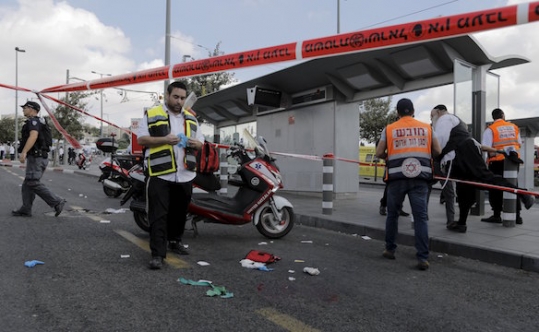-
Tips for becoming a good boxer - November 6, 2020
-
7 expert tips for making your hens night a memorable one - November 6, 2020
-
5 reasons to host your Christmas party on a cruise boat - November 6, 2020
-
What to do when you’re charged with a crime - November 6, 2020
-
Should you get one or multiple dogs? Here’s all you need to know - November 3, 2020
-
A Guide: How to Build Your Very Own Magic Mirror - February 14, 2019
-
Our Top Inspirational Baseball Stars - November 24, 2018
-
Five Tech Tools That Will Help You Turn Your Blog into a Business - November 24, 2018
-
How to Indulge on Vacation without Expanding Your Waist - November 9, 2018
-
5 Strategies for Businesses to Appeal to Today’s Increasingly Mobile-Crazed Customers - November 9, 2018
Netanyahu Bans Parliament Visits to Jerusalem Holy Site
Israeli security forces and forensic police inspect the site of a stabbing attack carried out by a Palestinian against an Israeli man in the city of Jerusalem on October 8, 2015.
Advertisement
Israel has beefed up security in response to the violence in Jerusalem, and on Thursday police set up metal detectors at the entrance to Israel’s Old City.
It was the latest violence in a week in which bloody attacks left four Israelis dead.
In a bid to lower tensions, Prime Minister Benjamin Netanyahu’s office announced he had banned Israeli cabinet ministers and legislators from visiting a sensitive Jerusalem religious site holy to Muslims and Jews.
Two hours later a Palestinian terrorist stabbed an IDF soldier, who sustained light wounds, and took his gun in the southern Israeli city of Kiryat Gat.
The man then fled into a residential building, where he reportedly forced his way into one woman’s flat, grabbed a kitchen knife and attempted to stab her after realising that the rifle did not have a magazine.
In the evening, police officers on patrol in the Abu Tor district of East Jerusalem apprehended an Arab suspect with a knife after he tried to stab them, Supt Rosenfeld said.
In all, four Israelis have been killed in stabbings and a roadside shooting in recent days, while five Palestinians, including three attackers, have been killed. The victim was treated at the scene and then taken to Jerusalem’s Shaare Tzedek Hospital.
A Palestinian got off a bus in Petah Tikva, a Tel Aviv suburb, and stabbed a man, a police spokeswoman said, adding that the assailant was overpowered and taken into custody. The victims in both attacks were all moderately wounded.
Israeli Arab lawmakers have vowed to defy the order and visit the compound on Friday, when many Muslims attend prayers at Al-Aqsa.
The vicious spike in violence between Palestinians and Israelis has now spread beyond Jerusalem and the West Bank, the historical hotspots.
The Jordanian-administered holy site has been at the centre of the recent unrest, with Israeli riot police storming the compound to evict Palestinian protesters barricaded inside. Jews revere the site as the location of two ancient temples.
Many Palestinians believe that Israel is trying to expand a Jewish presence at the site, a claim Israel adamantly denies.
Still, he says their “hands are with those who are protecting Al-Aqsa mosque”.
Mr Abbas, fed up with years of diplomatic paralysis and unpopular with his public, does not want to appear to be caving in to Israeli pressure.
“What we have done is encourage all the different parties…to find a way to prevent any further escalation and hopefully have a restoration of calm”, Rhodes said.
However, Israel and the West Bank witnessed more incidents of violence on Wednesday, including three stabbings and an Arab shot dead by the police.
Dozens of Palestinian protesters threw stones at Israeli troops near the West Bank city of Ramallah and elsewhere on Thursday.
Advertisement
“The Israeli as well as the Palestinian people have the right to live in security”, she said. Elsewhere, in the West Bank, two Palestinian students were shot and injured by Israeli forces after throwing stones at settlers’ cars.





























